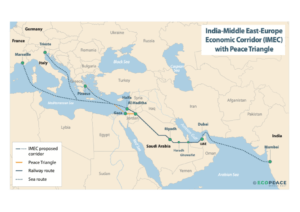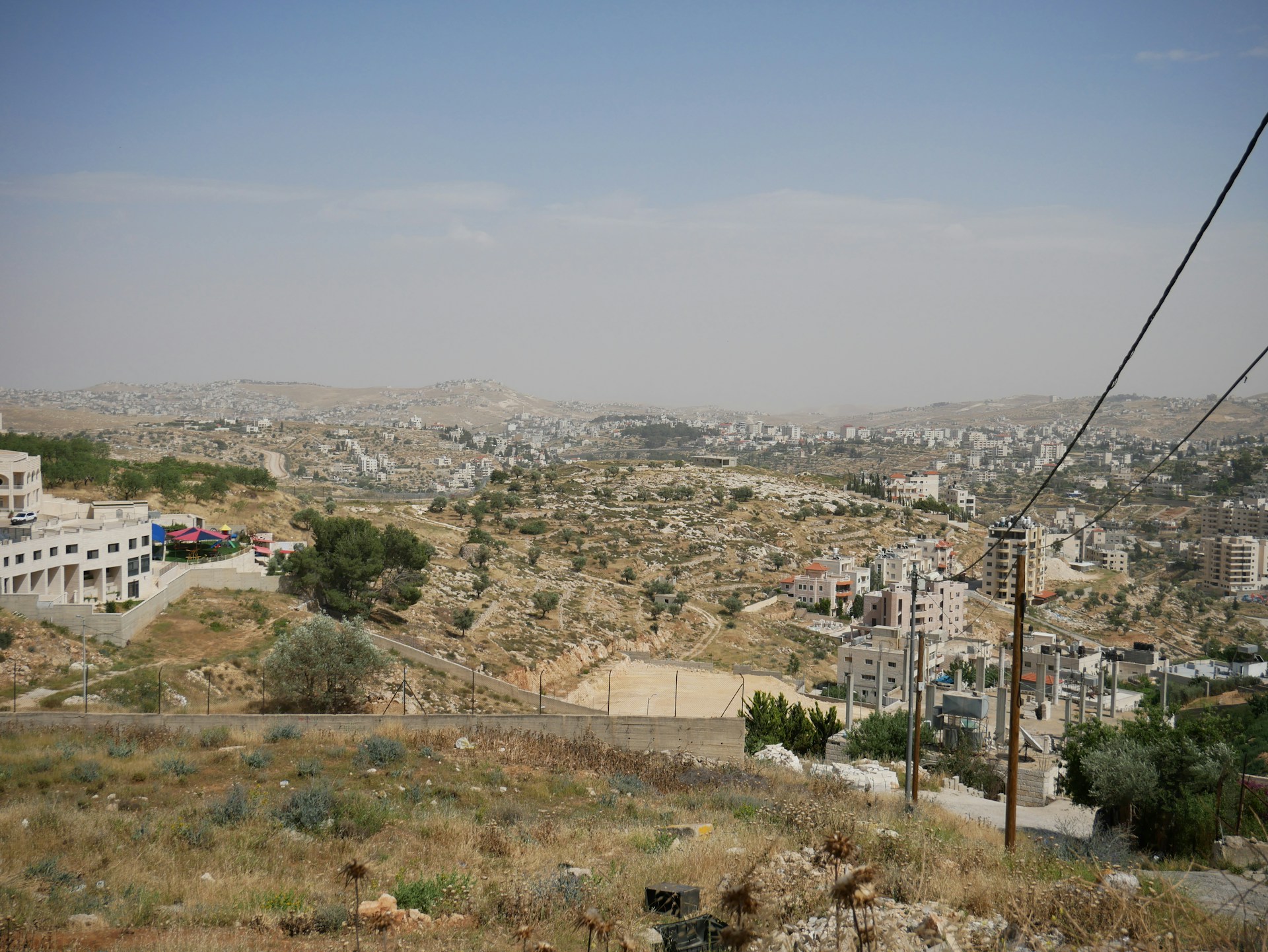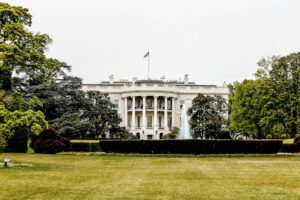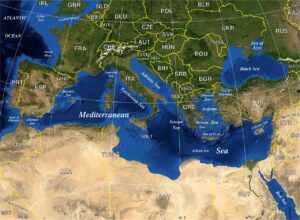On 2 April 2025, Italian Foreign Minister Antonio Tajani announced the appointment of Ambassador Francesco Maria Talò as Italy’s Special Envoy for the India-Middle East-Europe Economic Corridor (IMEC). This is a long-awaited appointment, following the relaunch of the IMEC project, in the context of the recent meeting between Indian Prime Minister Narendra Modi and US President Donald Trump and the visit of European Commission President Ursula von der Leyen to India, and shortly before Minister Tajani’s scheduled visit to India on 10-11 April.
IMEC is a strategic project for Italy’s geopolitical and geoeconomic influence, as well as being a vehicle for connectivity in the Mediterranean. Given Italy’s deep relations with most actors involved in the project—India, the Gulf countries and the US—Rome has the opportunity to strengthen the links between this initiative and efforts to promote stability and development in the Middle East.
IMEC: connectivity, stability and development
IMEC aims to facilitate trade and economic cooperation, promoting integration between the actors and regions involved. The project envisions the construction of an infrastructure corridor that starts in India and reaches Europe, passing through the United Arab Emirates, Saudi Arabia, Israel and Greece. Also known as the Cotton Road, IMEC will enable the transit of goods and services, create connections between the countries’ electricity grids and introduce new infrastructure for the export of green hydrogen to Europe.
Italy’s participation in IMEC reflects a new diplomatic and commercial approach towards the Indo-Pacific, representing an extension of the concept of an “Enlarged Mediterranean.” The initiative offers an important opportunity to consolidate Italy’s geopolitical role and strengthen commercial ties with strategic partners such as India and the Gulf countries —this is necessary especially when considering the uncertainties of the current global market.
IMEC, launched in 2023 under the G20 framework and signed by the US, the EU, Italy, Germany, France, the United Kingdom, India, Saudi Arabia, the United Arab Emirates and India, was put on hold following the outbreak of conflict in the Middle East, highlighting the close link between regional stability and the progress of the initiative. In fact, the complex diplomatic solution and devastation caused by the conflict in the Middle East have slowed down the normalisation process between Israel and Saudi Arabia, and consequently, the project. On the other hand, it would be difficult for IMEC to proceed without addressing the region’s security issues.
In an increasingly fragmented geopolitical context, investing in peace and sustainable development in the Middle East is not just a humanitarian necessity, but also a matter of global security, stability and development.
In this context, integrating Gaza and the Levant into the IMEC project could accelerate its implementation and lay the foundation for a new economic interdependence between Israel, Palestine, neighbouring countries and those involved in the project, thus helping to foster development and stability, starting from shared interests.
The reconstruction of Gaza: beyond emergency relief
The reconstruction of Gaza could present an opportunity to restore global confidence in multilateralism and international institutions while serving as a geopolitical indicator for the strength of alliances, even among Western powers.
According to a recent joint report by the United Nations, the European Union and the World Bank, Gaza’s reconstruction will require investments of over $53 billion in the next decade, with $20 billion needed in the first three years.
The international debate on how to manage this reconstruction has already begun: US President Donald Trump’s proposed plan to transform Gaza into the “Riviera of the Middle East” has provoked strong reactions, including from Arab leaders. Saudi Arabia, Egypt, the United Arab Emirates, Qatar and Jordan have proposed an alternative solution, which has also been welcomed by Italy.
Discussing reconstruction amid ongoing hostilities is not just a theoretical exercise but a strategic necessity to plan for and be ready to support security, stability and sustainable development in the aftermath of the conflict. The reconstruction of the region cannot be limited to merely restoring destroyed infrastructure, but must be oriented towards sustainability and resilience, through investments in renewable energy, infrastructure and sustainable economic development policies. According to the “Peace Triangle-IMEC” proposal developed by the think and do tank EcoPeace Middle East, the political and diplomatic nature of such a plan for Gaza should converge within broader existing regional cooperation initiatives, such as IMEC.

Italy’s Role
Italy has repeatedly expressed its support for a two-state solution as the key to lasting peace in the Middle East. Foreign Minister Antonio Tajani has reaffirmed this position in several meetings with Israeli and Palestinian leaders, while President of the Council of Ministers Giorgia Meloni has emphasised the importance of starting a political process alongside reconstruction.
On a humanitarian level, Italy has already allocated over €104 million in aid to Gaza, including the “Food for Gaza” mission, but emergency aid alone is not enough. A long-term strategy is needed – one that integrates sustainable development policies, infrastructure investments and diplomatic solutions to ensure stability in the region.
Italy is well-positioned to contribute directly to peace in the Middle East and play a central role, leveraging its strong transatlantic relations, particularly with the Trump administration; its Indo-Pacific influence, built through ties with Prime Minister Modi; its renewed relations with the Gulf countries; and its historical connections in the Mediterranean and Levant, including with both Israel and the Palestinian Authority.
Linking IMEC’s ambitious diplomatic, economic and infrastructural project to the resolution of the Israeli-Palestinian conflict would help create regional integration through healthy interdependencies between Israel, a potential future Palestinian state and the countries of the region, while also unlocking the project’s development process.
Furthermore, supporting this initiative would provide Rome with the opportunity to accelerate and strengthen its leadership in an initiative which can be strategic both for peace and security in the broader Mediterranean and for the future of global trade and connectivity.
EcoPeace’s proposal
The proposal from the regional organisation EcoPeace Middle East promotes regional integration between Israel, the future State of Palestine and Jordan within the IMEC strategic framework, through the development of three catalysing projects: (1) Palestine’s participation in the “Prosperity” project for joint management of water and energy resources, (2) the creation of a renewable energy export hub in Gaza and (3) the development of an electrified railway network connecting the Middle East to the Mediterranean, including the construction of a commercial port in Gaza.
As in the post-war European Coal and Steel Community model, economic and security interests could intertwine, forging a powerful front of common interests in the region that could effectively counter extremist forces.
Incorporating the Peace Triangle into the IMEC strategic framework could have a positive and lasting impact on regional security dynamics over the short to medium-term, thus aligning with the national interests of the signatory countries, including Italy.
Photo by Natacha de Hepcée








